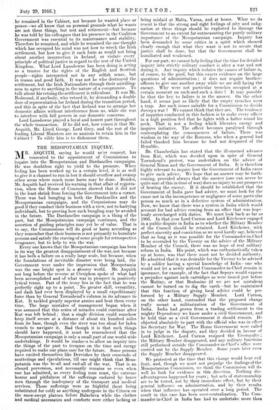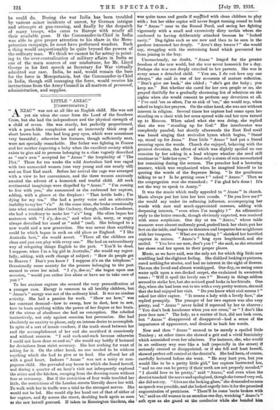THE MESOPOTAMIAN INQUIRY.
MR. ASQUITH, saying he would ne'er consent, has consented to the appointment of Commissions to inquire into the Mesopotamian and Dardanelles campaigns. He was doubtless right to yield to the pressure. When feeling has been worked up to a certain level, it is as well to give it a channel to run in lest it should overflow and swamp other areas where much more harm may be done. Besides, Mr. Asquith had received his warning in that affair of registra- tion, when the House of Commons showed that it did not in the least shrink from forcing the Government into a corner. There was bad bungling in both the Dardanelles and the Mesopotamian campaigns, and the Commissions may do good if they conduct'their business with a view, not to harrying individuals, but to proving how such bungling may be avoided in the future. The Dardanelles campaign is a thing of the past, but the MesOPOtimian campaign continues, and the assertion of guiding principles may yet be of value. That is to say, the Commissions will do good or harm according as they remember that their business is not primarily to humiliate persons and satisfy the craving of some people for retrospective vengeance, but to help to win the war.
Every one knows that the Mesopotamian campaign has been in its way the greatest disappointment of the war, not because it has bedh a failure on a really large scale, but because,' when the foundations of inevitable disaster were being laid, the Government were under the impression that Mesopotamia was the one -bright spot in a gloomy world. Mr. Asquith not long before the reverse at Ctesiphon spoke of what had been accomplished and of what was in prospect in positively 'lyrical terms. Part of the irony lies in the fact that he was ,perfectly right up_ to a point.. No greater skill, versatility, and dash had ever been displayed by a small expeditionary force than by General TOwnshend's 'colu'mn in its' advance to Kut. It tackled greatly superior armies and beat them every time. The large mistakes of management began when it was assumed that this series of miracles could continue after .Kut was left behind ; 'that a single division could somehow keep itself secure at a distance of about six hundred miles from its base, though even the river was too shoal for laden vessels to navigate it. Bad though it is that such things should have happened, it must be remembered that the Mesopotamian campaign is only a small part of our world-wide undertakings. It would be madneFs to allow an inquiry into the things of the past to trespass on the time• and energy required to make our plans sure for the future. Some persons have excited themselves like Dervishes by their crescendo of mutterings and ejaculations, till one might think that Meso- :potanda was the be-all and end-all of the war. That is an absurd perversion, and necessarily remains so even when one has admitted, as every feeling man must, the extreme horror and pitifulness of the sufferings endured by brave men through the inadequacy of the transport and medical services.' Those sufferings were as frightful (heat being Substituted for cold) as anything undergone in the Crimea on the snow-swept plateau before Balaclava while the clothes and medical-necessaries and comforts were either lacking or being mislaid at Malta, Varna, and at home. What we do resent is that the strong and right feelings of pity and indig- nation at these things should be exploited to damage the Government to an extent far outmeasuring the purely military importance of the Mesopotamian campaign. Inquiry has been demanded by some critics in a spirit which showed clearly enough that what they want is not to secure that Justice shall be done, but that the Government shall be humiliated and weakened.
For our part, we cannot help feeling that the time for detailed inquiry into strictly military conduct is after a war and not i during it. Any inquiry which isolates the causes of failure is, of course, to the good, but this exacts evidence on the large questions of administration ; it does not require brother- officers to give one another away while we are still facing the enemy. Why were not particular trenches occupied at a certain moment on such-and-such a date ? It may possibly be that the key to failure is in the answer. On the other hand, it seems just as likely that the empty trenches were a trap. Are such issues suitable for a Commission to decide during a war ? We cannot think that they are. The tendency of inquiries conducted in this fashion is to make every officer in a high position feel that he fights with a halter round his neck. That is not a feeling which liberates energy and inspires initiative. The officer becomes paralysed through contemplating the consequences of failure. There was wisdom in the way of the Romans, who when a general had failed thanked him because he had not despaired of the Republic.
Mr. Chamberlain has stated that the ill-omened advance from Kut, which was decided upon in spite of General Townshend's protest, was undertaken on the advice of General Nixon and the Government of India. It is therefore highly relevant to inquire how the Government of India came to give such advice. We hope that an answer may be forth- coming, provided always that the answer (one can never be quite sure of this in time of war) does no injury to our prospects of beating the enemy. If it should be established that the Government of India gave bad advice, we must look for the cause not in the incompetence or negligence of some particular person so much as in a defective system of administration. Now, we know that there was a system in India which would account for bad advice coming from an office that was hope- lessly overcharged with duties. We must look back as far as 1905. In that year Lord Curzon and Lord Kitchener engaged in a public dispute in India as to whether the Military Member of the Council should be retained. Lord Kitchener, with perfect sincerity and conviction as we need hardly say, believed that so long as it was possible for the Commander-in-Chief to be overruled by the Viceroy on the advice of the Military Member of the Council, there was no hope of real military reform in India. His point, which was enthusiastically taken up at home, was that there must not be divided authority. He admitted that it was desirable for the Viceroy to be advised by a soldier having a special knowledge of India—one who would not let a newly arrived Commander-in-Chief remain in ignorance, for example, of the fact that Sepoys would exprese a prejudice against such cartridges as were issued just before the Mutiny, or that Brahmins (if we are not mistaken) cannot be turned on to dig the earth—but he maintained that this function of giving local advice could be per- formed by a Military Supply Member. Lord Curzon, on the other hand, contended that the proposed change really meant a militarization of the Government of India. India had grown from a trading settlement to the mighty. Dependency we know under a civil Government, and he held that as a civil Government it should remain. He objected absolutely to part with the official who was in effect his Secretary for War. The Home Government were called in to judge in the dispute, and they decided in favour of Lord Kitchener. Lord Curzon resigned the Viceroyalty ; the Military Member disappeared, and any military functions still performed outside the Commander-in-Chief's office were carried out by the Supply Member. Some years later even the Supply Member disappeared.
We protested at the time that this change would bear evil fruit, and, though we must not prejudge the findings of the Mesopotamian Commission, we think the Commission will do well to look for evidence in this direction. Nothing dis- advantageous happened for years but acts of statesmanship are to be tested, not by their immediate effect, but by their general influence on administration, and by their results when that influence has operated over a long period. The result in this case has been over-centralization. The Com- mander-in-Chief- in India has had to undertake more than he could do. During the war India has been troubled by various minor incidents of unrest, by German intrigue and attempts at gun-running, and finally by the despatch of many troops, who came to Europe with nearly all their available guns. If the Commander-in-Chief in India was able to give proper attention to his share in the Meso- potamian campaign, he must have performed wonders. Such a thing would unquestionably be quite beyond the powers of the -ordinary man. We think we cannot be far astray in point- ing to the over-centralization of military affairs in India as one of the main sources of our misfortune, for Mr. Lloyd George in his first speech as Secretary for War virtually admitted our case. India, he said, would remain the base for the force in Mesopotamia, but the Commander-in-Chief in India, though still managing the force, would receive his instructions from the Army Council in all matters of personnel, administration, and supplies.































 Previous page
Previous page